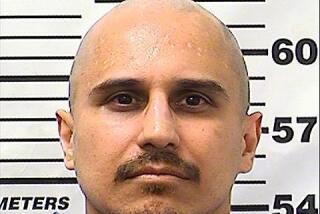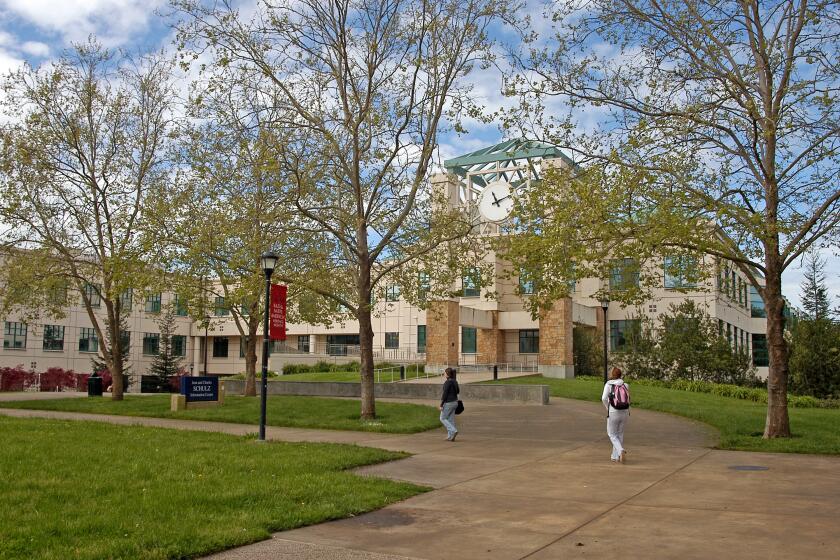Tracking Jonathan Among Foster Kids
Where is Jonathan?
He is 12 years old now, a boy with a faltering body and a soaring mind. One morning in June, he just didn’t show up at his Glendale elementary school, and is now somewhere among the other 49,999 or so children in the child welfare system of Los Angeles County.
Legally, I can’t even print his last name, a Spanish surname, even though he signed it on a letter to me. The Department of Children and Family Services may not be able to tell you the whereabouts of every single child in its care, but you can bet it can find a lawyer fast if someone violates the sanctity of anonymity.
Someone at Jonathan’s school found the letter in the boy’s desk after he disappeared. He mentioned me in a school assignment, too, and both were passed along to me.
Let me tell you first what little I know of Jonathan, which is through Donald Galleher, a volunteer who read to special-ed kids at the school every Thursday, and who speaks of the boy in the past tense, as if he had vanished from life, which in a way he has, at least from the life he knew.
Galleher met Jonathan three years ago, when the boy was 9. Jonathan, who has muscular dystrophy, at the time lived with his father and his father’s girlfriend in an upper-floor apartment, which meant he had to be carried up and down to his wheelchair every day. He hadn’t always been in a wheelchair; at 9, he had a cane. By 10 or 11, he was on crutches, and at last in a wheelchair, in which he sometimes spun wheelies on the playground at recess.
When Galleher met Jonathan, the boy was just beginning to master reading and writing. In three years, he had burst out of the gate and passed the competition. As Galleher says, “I just watched this boy blossom.”
That’s how I come into this. Jonathan adored reading and watching PBS, including a program I do about books and authors. Here is the penciled letter he addressed to me on June 7, on school writing paper:
“Dear Pat Morrison How are you? I’m doing fine. This is your name in Greek [and this 12-year-old boy rendered my name in the Greek alphabet]. I saw you on TV for the first time on Sunday, April 21, 2002.... What does the book ‘Three Apples Fell From Heaven’ [a book discussed on the program] is about? ... What are novels?”
A month earlier, Jonathan, the PBS fan, was writing an assignment about whom he would take to dinner if he could. He named Charlie Rose, Bill Moyers, Roger Mudd, painting-show host Donna Dewberry and me. “We would eat at the malt shop. We will eat 3 sandwiches. We would drink chocolate milk shakes.”
And then, from one school day to the next, he was gone. His social worker hasn’t returned my call. Folks at the school are legally leery of talking about him, as if he were one of those people who suddenly gets snipped out of the group photo on the Kremlin balcony. And all I want to do is buy him those milkshakes.
L.A. County does foster care the way it does just about everything else--big and messy. In its broad child-welfare reach are about 50,000 children. One law of foster care is, nothing is forever. In 10 years, one girl moved 36 times. You can’t do that to a shrub and expect it to thrive--why should it be any better for a child?
It’s a city-sized population of children who got a raw deal from the first adults in their lives--addict mothers, felon fathers, grown-ups who beat them up or molested them or neglected them. That’s how they came into an overloaded system that, like some of the families they were born into, has too many kids for the money and the people and the time available to care for them properly.
Some foster parents, and some foster care workers, manage to do it right, in spite of the odds. But L.A. County has to improve those odds. Having been beaten up plenty by the lawsuit stick, maybe the county will at last rethink its job as the third parent to 50,000 kids.
*
Two years ago, a 15-year-old named Katie Goldsmith read a story about a girl her own age, trekking from foster home to foster home with all her possessions slung over her shoulder in a flimsy plastic trash bag.
To Katie, growing up on the Westside with a large, sturdy family, that was the ultimate insult. She couldn’t give them families, but she could give them a little dignity, and two years later, her nonprofit, a Case for Kids, is still collecting duffel bags and backpacks so these young nomads at least can get pinballed around with their possessions intact.
Maybe Jonathan has one of her duffels on his lap, packed with his beloved books.
Should anyone know where Jonathan is, give him my best. And tell him that novels are books of make-believe that sometimes tell stories about the way things might happen, in worlds where every child has a home, and every adult is as kind as every child wishes him to be.
*
Patt Morrison’s columns appear Mondays and Tuesdays. Her e-mail address is patt.morrison@latimes.com
More to Read
Start your day right
Sign up for Essential California for news, features and recommendations from the L.A. Times and beyond in your inbox six days a week.
You may occasionally receive promotional content from the Los Angeles Times.







